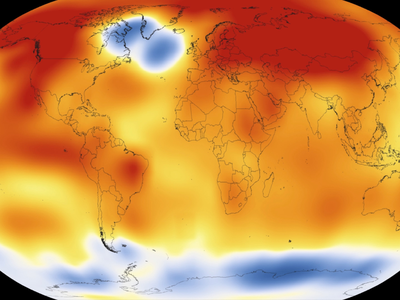Increased storminess may give rise to North Atlantic’s ‘cold blob.’

Image: While the rest of the world warms, a mysterious area in the North Atlantic seems to be becoming colder. Using computational techniques, a team of researchers are beginning to understand why -- and what that means for the climate. Credit: Wikimedia. All Rights Reserved.
UNIVERSITY PARK, Pa. — While climate change is making much of the world warmer, temperatures in a subpolar region of the North Atlantic are getting cooler. A team of researchers report that changes in the wind pattern, among other factors, may be contributing to this “cold blob.”
In a study published in Climate Dynamics, the researchers report that a northward shift in the jet stream is contributing to a cooling of about .7 degrees Fahrenheit over the past century. Using computer simulations, the researchers found that more than half — 54% — of the observed cooling trend is a result of increased heat loss from the ocean induced by the overlying atmosphere. Strengthened local convection — whereby ocean mixing brings cold water from depth to the surface — explains another 38% of the trend.
According to the team, storminess increased in the region because the jet stream moved northward. As a result, there are more frequent and more intense storms in this region. The increase in storminess creates a stronger heat loss from the ocean and induces stronger convection in winter, leading to cooler temperatures in the region.
According to Laifang Li, assistant professor of meteorology and atmospheric science, Penn State, who is also an Institute for Computational and Data Sciences co-hire, the researchers’ findings run counter to some past studies that have suggested that the cold blob is evidence of a slowdown in the Atlantic Meridional Overturning Circulation — or AMOC — a large system of ocean currents that carry warm water from the tropics northwards into the North Atlantic.
